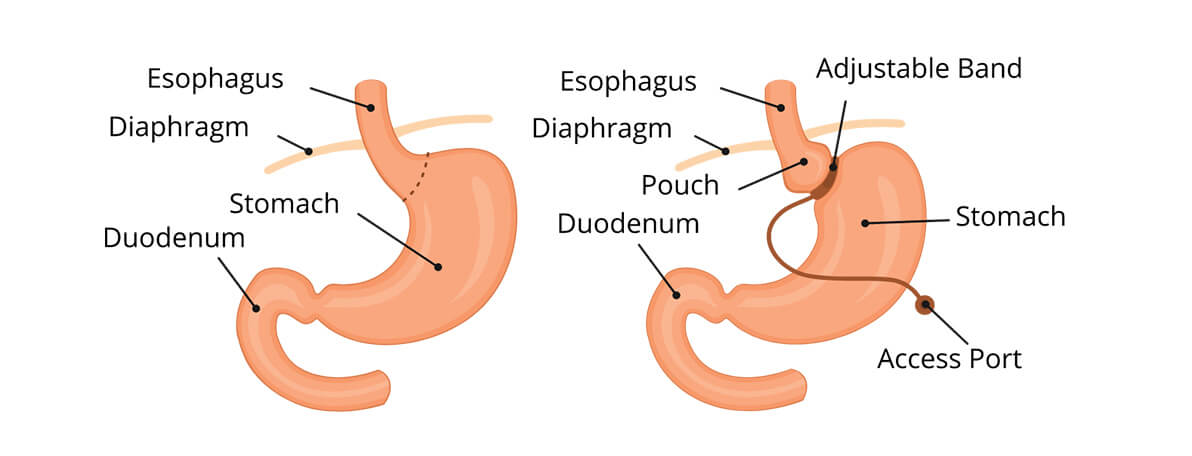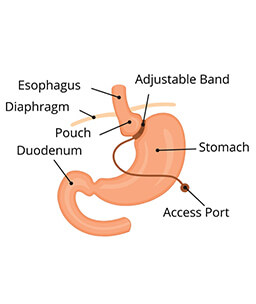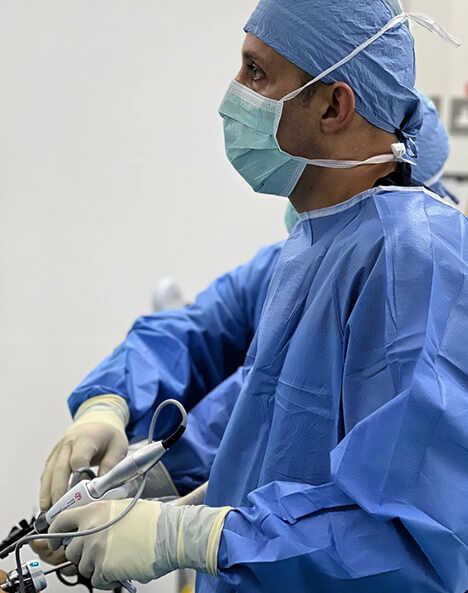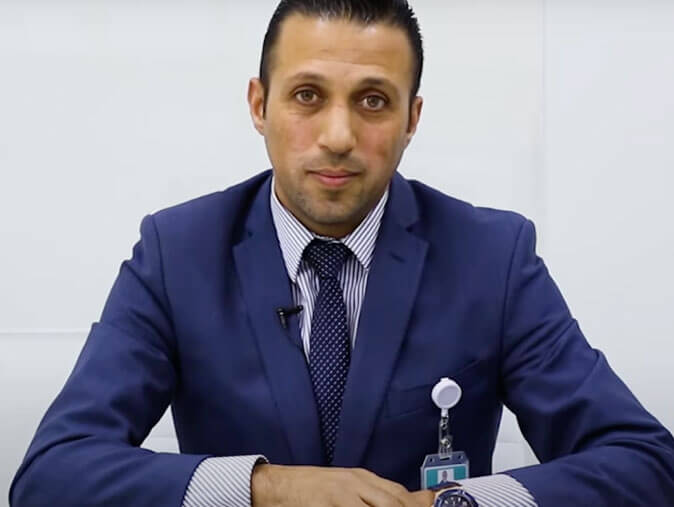What is a Gastric Band?
Gastric banding, also known as laparoscopic adjustable gastric banding (Lap Band), is a highly effective bariatric surgery designed to aid individuals in losing excess weight when traditional methods like diet and exercise have proven ineffective.
Understanding Gastric Banding
Gastric banding is a minimally invasive procedure that involves placing an adjustable silicone band around the upper part of the stomach, effectively dividing it into two sections. This creates a smaller pouch at the top, which restricts the amount of food the stomach can hold. Consequently, patients feel full much sooner, leading to reduced calorie intake and steady weight loss over time.


How Gastric Banding Works
The gastric band can be tightened or loosened through a port placed just beneath the skin. This allows for personalized adjustments to the band's tightness, making it possible to adapt to individual weight loss needs. By working with a healthcare provider, patients can fine-tune the band's restriction to optimize weight loss without compromising their well-being.
Benefits of Gastric Banding
Minimally Invasive: Gastric banding is a laparoscopic procedure, which means it involves small incisions, resulting in less scarring and a quicker recovery time compared to traditional open surgeries.
Reversible: Unlike some other weight loss surgeries, gastric banding is reversible. If necessary, the band can be removed, and the stomach returns to its original size and shape.
Gradual Weight Loss: Gastric banding promotes steady weight loss over time, which can lead to healthier and more sustainable results.
Tailored Adjustments: The adjustable nature of the band allows for personalized and continuous control of weight loss progress.
Short Hospital Stay: Most patients can leave the hospital within 24 hours after the surgery, contributing to a smoother recovery process.
Qualifications for Gastric Banding
While gastric banding can be life-changing for those struggling with obesity, it is essential to meet certain criteria to be eligible for the procedure.
BMI Requirement: Candidates typically need a BMI of 40 or higher (severe obesity) or a BMI of at least 35 with obesity-related health conditions for surgery qualification.
Weight Loss Efforts: Gastric banding is not the first option for weight loss. Candidates must have tried conventional methods and shown a commitment to improving their lifestyle.
Psychological Evaluation: Before gastric banding, candidates undergo a thorough evaluation, including consultations with dietitians, psychologists, and specialists to assess their emotional and physical readiness.
Gastric banding offers life-changing weight loss for those with obesity. Consult our team of expert medical professionals to see if you qualify and get guidance for your journey. Make an informed decision, and commit to long-term changes for your weight loss goals.
Understanding the Benefits of Gastric Banding
Weight Control
Gastric banding reduces stomach size, helping prevent obesity. This restricts food intake. Despite your diminished appetite, you may still eat a variety of things in lesser quantities. You will begin to feel full sooner, lowering your food intake and promoting weight reduction. This dual approach helps lose weight steadily.
Obesity-Related Health Issues
Overweight causes heart disease, sleep apnea, type 2 diabetes, and joint pain. Gastric banding-induced weight reduction may alleviate several obesity related health conditions. Weight loss reduces health risks and medicinal use, encouraging a healthier, more active lifestyle.
Life Improvement
Gastric Banding goes beyond weight reduction. It's about letting you live more. Weight loss improves mobility, energy, and health. It often boosts self-esteem, confidence, and mental wellness. This transformation affects all aspects of life in a positive way.
Safety Profile of Gastric Banding
Gastric Banding is simpler and speedier than other weight-loss operations. The approach minimizes intestine rerouting, decreasing problems. Laparoscopic gastric banding is less intrusive, quicker, and safer than other surgical treatments.
Physical Improvement
Obesity may affect physical function and quality of life. Gastric banding may assist and make your weight loss process easier.
Weight reduction improves flexibility, balance, and physical function. This may make life more joyful and enable you to do physical activities that were previously impossible owing to your weight.
Psychological Gains
Obesity may cause sadness, anxiety, and poor self-esteem. Gastric Banding may reduce these psychological issues by promoting noticeable weight reduction.
This improves mental health, relationships, and other simple pleasures of life. It can also enhance self-confidence promoting social comfort and well-being.
Operative Overview
This lap band surgery is performed one-to-two-hour under general anesthesia. The surgeon inserts the laparoscope and other equipment via minor abdominal incisions.
To form a pouch, a silicone band is inserted around the upper stomach. This limits the patient's food intake by reducing stomach capacity. A port beneath the abdomen connects the band.
The surgeon will suture or tape the wounds after the band reduces stomach capacity. Gastric banding, which reduces intake to lose weight, is less intrusive.
Preparation
Preparation for gastric banding surgery starts well ahead of the operation. If you've been approved for the procedure after a thorough medical assessment, you'll be asked to follow a special diet for two weeks. You'll receive clear instructions on this.
This diet aims to help decrease the amount of fat in and around your liver, increasing the safety of the surgery. Besides, it's vital to have an empty stomach during the operation, so you will need to fast for at least 12 hours before your surgery.
Post-Procedure Recovery
Hospital Stay and Initial Healing Phase
Patients who have undergone gastric banding typically stay in the hospital for one to two days for close monitoring and management of any discomfort or possible complications post-surgery.
During this time, your vital signs are tracked, pain is managed, necessary medications are administered, and the healing of your incisions is observed.
Nutritional Guidance and Dietary Guidelines
The dietary guidelines after gastric banding are designed to aid the healing process and promote weight loss. Initially, this involves a liquid diet for about 1 to 2 weeks, gradually transitioning to pureed foods, and, eventually, solid foods.
You'll be given detailed guidance about portion control, nutrient intake, and how to maintain a balanced diet to aid your weight loss journey and avoid complications while your stomach is healing. Since the quantity of your meals will be smaller, it is essential to chew your food thoroughly.
Physical Activity Instructions
Your recovery will also entail a gradual increase in physical activities. Starting with light movements, such as walking, and progressively moving to more strenuous activities as your recovery progresses is fundamental.
This can involve light aerobic exercises and strength training routines to help build muscle and boost metabolism.
Emotional Well-being Support
Although gastric banding primarily targets physical health improvement, it also carries psychological and emotional impacts. Providing emotional support to help patients navigate post-surgery adjustments and challenges is crucial.
For patients facing emotional struggles tied to food, body image, or self-esteem, counseling or therapy is strongly recommended.
Potential Hazards and Considerations
Gastric Banding is generally considered a safe surgical procedure, but it's important to remember that all surgeries carry potential risks and complications. Some typical issues that may occur post-surgery include:
Post-Surgery Risks
-
Hemorrhaging and infection: These are typical surgical hazards, albeit uncommon, and need to be monitored closely.
-
Blood clot formation: Blood clots may form in the legs and move to the lungs, requiring immediate medical intervention.
-
Cardiac rhythm disturbance: This can happen but is typically controllable with proper medical care.
-
Pneumonia: A risk that comes with anesthesia and surgical procedures.
Specific Risks Associated with Gastric Banding
-
Band slippage or erosion: The band might slip or erode into the stomach, which needs immediate medical attention.
-
Esophageal dilation: Enlargement of the esophagus due to overeating or band over-tightening.
-
Nutrient deficiencies: Altered digestive processing can lead to deficiencies in certain nutrients.
-
Gastroesophageal reflux disease (GERD): Symptoms may be worsened due to the new stomach structure but can often be managed with medication.
Irreversibility of Gastric Banding
It's important to know that Gastric Banding is a non-reversible procedure. Once performed, your stomach structure can't be restored to its original state. Therefore, it's critical to have an in-depth conversation about your expectations and possible outcomes with your healthcare provider before choosing this surgical option.
Significance of Post-Surgery Care
After the procedure, proper post-surgical care is paramount for your health and success. Routine follow-up appointments are necessary to:
-
- Ensure progress and wellness
-
- Monitor your development.
-
- Keep track of weight loss and overall health improvements.
-
- Handle complications: recognize and resolve any issues that may come up.
-
- Modify treatment strategy. If required, adapt the plan to fit your evolving needs.
-
- Provide guidance and support.
-
- Assist you in dealing with the changes following the surgery.
Commitment to Lifestyle Modifications
Gastric banding is not a simple solution; it demands a lifelong commitment to lifestyle alterations, such as:
-
- Establishing healthy eating habits: Concentrating on nutrient-dense foods and mindful portion sizes.
-
- Regular physical activity: Including exercise in your daily regimen.
-
- Behavioral changes: Making wise food choices and addressing eating patterns.
These lifestyle changes are vital for maintaining weight loss and overall health after the surgery. It's important to note that reverting to old habits can result in weight regain.
Body Contouring
Excess skin frequently follows rapid weight reduction. If it affects your comfort or self-esteem, surgery may help, but it's best to wait until your body stabilizes, which may take 18 months.
Supplements and Nutrition
Gastric banding may affect food absorption, making nutritional monitoring important. B12, iron, calcium, and vitamin D deficiencies may arise. Regular checkups and proper nutrition avoid issues.
Knowing the risks and benefits of gastric banding may assist you in losing weight. Post-operative care, lifestyle adjustments, and balanced eating may optimize the procedure's advantages and ensure long-term weight reduction success.
Always consult a qualified healthcare provider to discuss your personal situation and ascertain if Gastric Banding is the best choice for you.
Frequently Asked Questions
-
What is Gastric Banding?
Gastric banding is a surgical procedure designed to aid in weight loss. It involves fitting an adjustable silicone band around the top part of the stomach to limit its size.
-
How does Gastric Banding work for weight loss?+
The band shrinks the stomach, which means you'll feel full faster. This helps control the amount of food you eat and thus facilitates weight loss.
-
Is the Gastric Banding procedure safe?
Like any surgery, gastric banding comes with some risk. However, when performed by a skilled surgeon at a reliable clinic with proper analysis, it's generally considered safe.
-
How long does a Gastric Banding procedure take?
Typically, a gastric banding operation takes about 1 to 2 hours.
-
How much time does it take to recover from Gastric Banding?
Recovery varies from person to person, but most people can get back to their normal routine within 2 to 4 weeks.
-
Can Gastric Banding be reversed?
Yes, one of the advantages of gastric banding is that it's reversible. The band can be adjusted or removed if necessary.
-
What are the possible complications of Gastric Banding?
Some possible risks include infection, band slippage or erosion, and nutrient deficiencies. Long-term issues might include heartburn or stomach obstruction.
-
How much weight can I lose with Gastric Banding?
While it varies between individuals, most people lose about 40-50% of their excess weight in the first two years after surgery.
-
Will I need to make lifestyle changes after Gastric Banding?
Absolutely! Regular exercise and a healthy diet are key to maintaining weight loss and overall health after the procedure.
-
Who is a good candidate for Gastric Banding?
People with a Body Mass Index (BMI) of 40 or more, or those with a BMI of 35 along with health issues related to obesity, are typically considered good candidates. However, they should have failed previous attempts to lose weight through diet and exercise alone.
BOOK Now
Make An Appointment
-

80026763
Contact Dr. Samir if you have any questions
-

Visit
02 Jumeirah Beach Rd - opposite Burj Al Arab - Umm Suqeim - Jumeirah 3 - Dubai
Opening Hours:
9am-9pm (Saturday- Thursday)
9am-6pm (Saturday)






